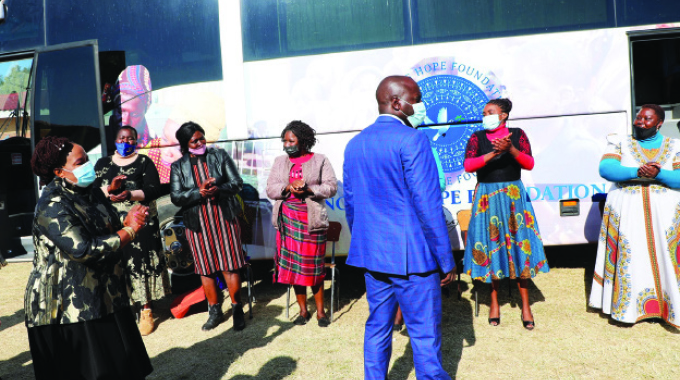First Lady applauded for cancer screening

Tendai Rupapa
Senior Reporter
THE National Aids Council (NAC) has applauded health ambassador, First Lady Auxillia Mnangagwa, for keeping an eagle eye on other killer diseases at a time when the whole world seems to have focused more on Covid-19.
NAC added that it was charmed and willing to extend a helping hand in First Lady’s cancer screening initiatives which are benefiting hundreds of men and women countrywide.
This comes at a time when cancer has become one of the major killer diseases in Zimbabwe demanding early detection and placement on treatment.
According to experts, early detection is key to successfully treating any form of cancer.
The First Lady is the country’s health Ambassador with a passion for the welfare of women and children. She works very hard to ensure citizens have access to food and healthcare.
The most common cancers in Zimbabwe are prostate cancer, which mostly affects men and breast and cervical cancer which affects women.
Thanks to the mother of the nation and her Angel of Hope Foundation’s mobile clinic, a cancer screening programme was held at ZRP Chimoio Camp Depot (formerly Tomlinson Depot) last weekend to ensure women have better health care and are treated early for cervical and breast cancer.
She also encouraged men to get screened for prostate cancer.
NAC chief executive Dr Bernard Madzima said his council was proud and humbled to be working with the First Lady in her health programmes.
“In support of her programmes, last week we joined her at Chimoio Camp Depot and held a combined awareness, advocacy and treatment campaign,” he said.
“Hundreds of women were screened for cervical and breast cancer. They also had HIV and Aids testing and received counselling services, family planning services. Therefore, continuation of the cancer screening services and health checks by the First Lady is a welcome move.”
Because of Covid-19, Dr Madzima said, people seemed to have taken a back seat in terms of their response to other health conditions.
“We have to be alert to the effect that the other health conditions which have been there before Covid-19 are still there and continue to cause morbidity and mortality to the population of Zimbabwe,” he said.
“We are grateful that the First Lady is prioritising other ailments, including the silent killer diseases.
“The First Lady’s awareness programmes are, however, necessary in saving lives.
“As NAC we will continue to support her in terms of technical expertise for the benefit of the nation. There is also a strong linkage between HIV and Aids and some cancers, so as NAC it is our mandate to be part of the response to anything which raises awareness, prevention, treatment and rehabilitation for both HIV and cancer.”
Amai Mnangagwa has spared no effort in ensuring that men and women are screened for cancer to allow for early detection which helps boost one’s chances of survival.
She has traversed the length and breadth of the country with her mobile clinic to ensure experts with whom she moves with, assist citizens to spare lives.
There is huge demand for cancer screening services in the country’s mining and farming communities where access to health services is minimal.
Recently, when she visited Impala Downs Farm compound in Mhangura, the First Lady heard harrowing tales of moral decay in the country’s farming communities characterised by prostitution, drug abuse, early child marriages, lack of healthcare and family planning which resulted in the birth of many undocumented children.
Women and men in these communities pleaded that she assists them with screening for cancer and other health checks.
Therefore, in an effort to close gaps and disparities faced by the public in accessing cancer screening services, the First Lady vowed to continue with her cancer screening programme for men and women.
She urged people at the surrounding farm compounds to get screened for cancer, HIV and other ailments so that if need be, they can be commenced on treatment early to ensure a higher survival rate.
“I will bring my Angel of Hope Foundation’s mobile clinic for everyone to be checked for diseases, including HIV,” she said.
“With that mobile bus, I am actually bringing a hospital here. Do not run away from screening so that you know where you stand. Let us start a new life here at Impala Downs compound.”
Addressing the gathering at Chimoio Camp Depot on Saturday last week, the First Lady said non-communicable diseases were becoming more prevalent and exerting a burden on people already infected and affected by HIV and Aids.
Women in particular, she added, were more affected by cancer, with 60 percent of all the new 7 000 cases recorded per year in Harare only affecting women.
Health experts say 80 percent of cancer patients seek treatment late, resulting in increased premature deaths.
“It is very disturbing to see women dying from cervical cancer as a result of ignorance and lack of access to diagnostic services,” she said.









Comments